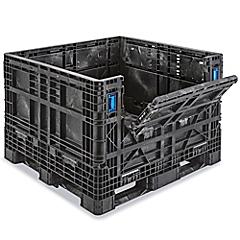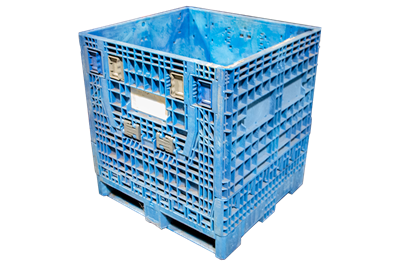The Function of Bulk Plastic Containers in Effective Recycling Practices and Sustainability
Mass plastic containers are indispensable to modern-day recycling efforts. Their design enhances the efficiency of material collection and transportation, contributing to sustainability objectives. These containers not just maximize room however also assist in checking contamination levels. Their execution is not without challenges. Comprehending the full scope of their impact discloses an intricate partnership in between logistics and environmental obligation that requires more exploration.
Understanding Bulk Plastic Containers
Mass plastic containers work as a necessary element in various markets, promoting the storage space and transportation of goods. These containers are typically made from robust products such as high-density polyethylene (HDPE) or polypropylene, which give longevity and resistance to environmental aspects. Their design often consists of attributes like stackability and modularity, permitting reliable use area during both storage space and transit.
Industries such as farming, food processing, and making frequently utilize bulk plastic containers due to their light-weight nature and simplicity of handling. The containers can be found in various sizes and configurations, dealing with the certain demands of various products. Their convenience prolongs past simple capability; they can likewise be customized with lids, deals with, and identifying alternatives to enhance use - plastic bulk containers. Consequently, bulk plastic containers play a critical function in maximizing logistics and supply chain operations throughout multiple sectors, therefore contributing to total performance and cost-effectiveness
Advantages of Utilizing Mass Plastic Containers in Recycling
When organizations focus on reusing efforts, the use of mass plastic containers greatly enhances the efficiency of the procedure. These containers are designed to maximize room, enabling for the storage and transportation of bigger quantities of recyclable materials. This results in fewer trips to recycling centers, therefore reducing gas consumption and connected discharges.
In addition, mass plastic containers are durable and resistant to different environmental aspects, making certain that materials remain protected during handling and transportation. Their light-weight layout further adds to decrease transportation prices.
The harmony of these containers facilitates much better sorting and handling of recyclable materials, which can enhance overall recycling prices. Organizations that take on bulk plastic containers additionally show a dedication to sustainability, favorably influencing their brand name photo. Eventually, these advantages not just simplify reusing practices however additionally add to wider environmental objectives
Just How Bulk Plastic Containers Facilitate Material Collection
Reliable product collection is considerably boosted by the usage of bulk plastic containers, as they give a organized and effective option for gathering recyclable things. These containers are created to suit large volumes of materials, which simplifies the sorting and storage space procedure. Their stackable design takes full advantage of space use, making it less complicated for facilities to arrange recyclables without clutter.
In enhancement, bulk plastic containers are weather-resistant and durable, permitting for outdoor placement without deterioration. This strength assures that materials continue to be safeguarded until they are collected for processing.

The uniformity in shapes and size of these containers assists in standardization throughout collection points, making it possible for better monitoring of recyclable quantities. Additionally, their clear nature enables simple presence of contents, helping in the surveillance of contamination levels and ensuring that just ideal materials are accumulated. Overall, bulk plastic containers play a critical duty in enhancing the material collection process, thus advertising effective recycling methods.
Transportation Performance and Environmental Effect
Transportation performance plays an essential duty in the reusing procedure, especially via the optimization of tons capacity in bulk plastic containers. By making best use of the volume of product transferred, business can considerably lower the variety of trips required, thereby reducing their carbon impact. This technique not only boosts operational performance yet likewise adds to a lot more lasting environmental practices.

Optimizing Tons Ability
Enhancing load capability is typically neglected, it plays an essential function in enhancing transport effectiveness and lessening ecological effect in reusing techniques. By maximizing the quantity that bulk plastic containers can hold, recycling operations can decrease the number of trips needed for transportation. This not only decreases gas intake yet likewise lowers the deterioration on vehicles. Reliable load monitoring enables centers to utilize area effectively, making certain that each transport cycle is as productive as feasible. In addition, well-optimized tons can bring about far better arrangements with logistics carriers, potentially minimizing total expenses. Eventually, boosting lots capability adds to an extra lasting recycling system by promoting effective source use and lessening waste created throughout transport.
Decreasing Carbon Footprint
As reusing operations endeavor to lessen their ecological influence, reducing the carbon impact connected with transportation becomes an important objective. Mass plastic containers play a crucial role in accomplishing this goal by improving tons performance and maximizing logistics. Their light-weight yet durable layout allows for optimum freight room utilization, reducing the number of journeys required to move materials. By settling deliveries, recycling centers can lower fuel intake and greenhouse gas discharges. Additionally, purposefully locating recycling facilities decreases transport ranges, in addition decreasing carbon outcomes. Using fuel-efficient lorries and alternative power sources boosts overall sustainability. By incorporating these practices, the reusing sector can significantly lessen its carbon impact, adding to a much more sustainable future.
Obstacles in making use of Bulk Plastic Containers

Contamination Problems
Contamination issues represent a substantial challenge in the effective use mass plastic containers within recycling techniques. These containers frequently accumulate residues from previous materials, leading to mixed materials that can prevent the recycling procedure. Impurities such as food waste, chemicals, or non-recyclable materials can compromise the stability of the whole set, resulting in increased disposal expenses and decreased reusing prices. Additionally, incorrect cleaning or sorting can worsen these concerns, making it hard for recycling facilities to process materials effectively. The visibility of impurities not just affects the quality of recycled products however additionally weakens the general sustainability efforts focused on decreasing plastic waste. Dealing with these go to my site contamination challenges is essential for boosting the efficacy of bulk plastic container recycling.
Recycling Infrastructure Limitations
Ineffectiveness in recycling framework postures substantial obstacles for the reliable monitoring of bulk plastic containers. Numerous recycling facilities lack the ability to process large volumes of these containers effectively, resulting in enhanced hold-ups and expenses. Poor sorting innovations typically lead to contamination, as bulk containers might be blended with various other materials, making complex the reusing process. Limited transport choices additionally prevent the motion of bulk plastic containers to ideal recycling centers, bring about raised land fill waste. In addition, an absence of standard procedures for bulk container recycling produces confusion amongst services and consumers, additionally making complex initiatives to promote sustainability. Resolving these facilities restrictions is important to boost recycling practices and maximize the possibility of mass plastic containers in a circular economic climate.
Finest Practices for Applying Mass Plastic Containers
When organizations consider carrying out bulk plastic containers find out in their reusing methods, they need to focus on a calculated approach that improves performance and decreases contamination dangers. Initially, picking the suitable container size and type is necessary to suit the volume of products being refined. Organizations ought to likewise develop clear labeling and signs to lead individuals on correct disposal approaches, minimizing confusion and mistakes. Regular training sessions for team can further strengthen these techniques, guaranteeing every person recognizes their functions in maintaining recycling honesty.
In addition, companies need to implement a regular upkeep schedule to evaluate and clean containers, preventing the accumulation of pollutants. Partnering with regional recycling centers can likewise enhance the collection process, guaranteeing that materials are effectively processed. Organizations need to keep an eye on and examine their reusing metrics, utilizing this information to improve techniques over time and promote continual improvement in their sustainability initiatives.
The Future of Bulk Plastic Containers in Lasting Practices
As companies significantly focus on sustainability, the function of mass plastic containers in recycling practices is established to develop considerably. Innovations in materials science are resulting in the advancement of naturally degradable and recyclable choices, improving the environmental advantages of bulk plastic containers. On top of that, the application of closed-loop systems will enable much easier collection and repurposing of these containers, minimizing waste and resource usage.
Technical advancements, such as clever radar, will certainly make it possible for companies to keep an eye on the lifecycle of mass containers, enhancing performance in recycling processes. As consumer demand for lasting practices grows, businesses will likely embrace mass plastic containers designed for reuse and long-lasting worth. Collaboration between industries and governments will certainly cultivate the establishment of standard recycling procedures, ensuring that mass containers are efficiently incorporated right into more comprehensive sustainability efforts. Overall, the future of bulk plastic containers shows up promising, with substantial possibility for adding to a round economic situation.
Frequently Asked Questions
How Are Bulk Plastic Containers Made and What Products Are Used?
Bulk plastic containers are usually made from high-density polyethylene (HDPE) or polypropylene check that (PP) These materials are processed with injection molding or blow molding strategies, causing durable, lightweight containers suitable for different storage space and transportation needs.
Can Bulk Plastic Containers Be Reused Multiple Times Prior To Recycling?
Yes, bulk plastic containers can be recycled multiple times prior to reusing. Their resilience and style enable for duplicated use in different applications, promoting sustainability and resource effectiveness while minimizing the need for new containers.

What Accreditations Exist for Mass Plastic Containers in Recycling?
Different certifications for mass plastic containers include the Recycling Partnership's qualification, the Cradle to Cradle Qualified ™ requirement, and the Lasting Product packaging Coalition's standards, making sure containers satisfy specific ecological and recyclability criteria for efficient recycling.
Exactly How Do Bulk Plastic Containers Compare to Various Other Recycling Storage Space Options?
Bulk plastic containers supply higher durability and capability contrasted to other reusing storage choices, reducing the threat of contamination and helping with reliable transport. Their design sustains much better company, enhancing total efficiency in reusing operations.
What Is the Lifespan of a Mass Plastic Container in Recycling Processes?
The life-span of a mass plastic container in recycling procedures generally ranges from 5 to one decade, depending on usage, worldly top quality, and ecological conditions, permitting several cycles of usage before ultimate disposal or recycling.
When organizations focus on recycling efforts, the application of mass plastic containers significantly improves the performance of the process. Transport effectiveness plays a crucial function in the reusing process, specifically via the optimization of tons capability in bulk plastic containers. The usage of mass plastic containers in recycling methods deals with substantial obstacles, specifically concerning contamination concerns and limitations within recycling infrastructure. Contamination concerns stand for a significant difficulty in the effective use of bulk plastic containers within reusing techniques. When companies take into consideration executing bulk plastic containers in their recycling practices, they should prioritize a tactical method that enhances efficiency and minimizes contamination dangers.